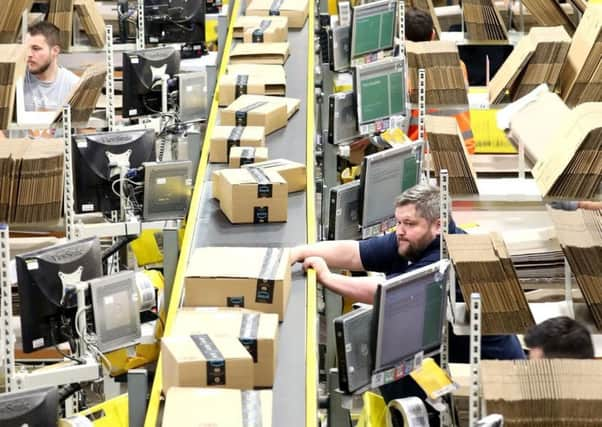GP Taylor: Make the internet giants pay for death of our shops


Quietly, other independent shops come and go. One week they are here and the next they are gone. The main street constantly changes and news is that on the outskirts of the town there will soon be an M&S and an Aldi.
More shoppers will be lured away from the town to the easy free parking of the malls. The car parks that are near to town are filled with camper vans, taking their fill of cheap overnight parking and filling the drains with sanilav.
Advertisement
Hide AdAdvertisement
Hide AdIn some places, it looks like the centre of many of our towns are closing down. Wherever I go in Yorkshire, I am subliminally used to the sight of shuttered and boarded shops. It is quite normal to see ‘To Let’ signs encouraging people to sign up to the risky business of opening a shop.
Having once done it myself, I know how hard it can be. Converting an old run-down building to be a café and bookshop for my daughter to run wasn’t an easy task. Thankfully, she soon had a good business and her hard work paid off.
She was lucky. So many high street businesses fail quickly and in the current climate, things are getting worse. As a child, my favourite shop was Woolworths. It was a British institution. Now it is just a distant memory. Likewise, BHS is another name to add to a growing list of shops that have closed. Their passing often leaves an empty scar on the shop frontage of our towns. Yet, councils appear to demand higher and higher business rates.
It is a known that 11 stores a day open on average, while 16 a day close. Official figures state that between 2020 and 2030 half of the UK’s existing shop premises will have gone. 100,000 stores will close, leaving just 120,000 shops on our high street. All because by 2030 e-commerce will account for around 40 per cent of all UK retail sales. It is becoming just too expensive to be a shopkeeper anymore.
Advertisement
Hide AdAdvertisement
Hide AdOn top of this, local councils appear to be doing their best to add to the woes of shopkeepers. People are driven away from the town centre by punitive restrictions on parking. Car drivers complain about rising charges, fewer spaces and spaces that are too small. My local council appears to make parking infringements its number one cash cow. You may never see a copper walking the street, but in Whitby, the parking patrols go by two-by-two
In many towns, local shops that once flourished are now closed. People would now prefer to shop out of town or on the internet. Both are areas where revenue is taken away from local councils. Both seriously add to the decline of the high street.
Yet, town centres are an important part of our communities. They are places to meet friends, talk, and catch up on life events. Our town centres employ thousands of people. They are the life blood of the community and need to be supported.
I would urge the Government to put a postcode levy on internet sales. It would be quite easy to apply. Whatever company took the order would simply pay a 10 per cent charge to the local council where the purchase was made. In that way, local business rates could be eased and young entrepreneurs encouraged.
Advertisement
Hide AdAdvertisement
Hide AdWhy should local councils miss out on revenue from shoppers buying goods from faraway places?
The same revenue levy could also be placed on out-of-town shopping. Multi-national companies should be willing to pay something from their profits back to the communities they exploit. It is no good just paying tax or paying little tax. Why can’t they pay to subsidise the small businesses they are working so hard to put out of business? In Yorkshire, we have some of the largest internet giants trading close to the major motorways. Surely, they should be made to pay a percentage to the towns where they put people put of work?
Then, and only then, would our high streets become a permanent fixture. Small businesses would be in an environment where they could flourish and shoppers would have a proper high street once again where there would be a diversity of shops.
It doesn’t have to be an us and them situation with local shops and out of town and internet sales. All that those who support remote shopping should understand is that they have a responsibility to keep local communities funded – and local people in much needed jobs.
GP Taylor is a writer and broadcaster. He lives in Whitby.